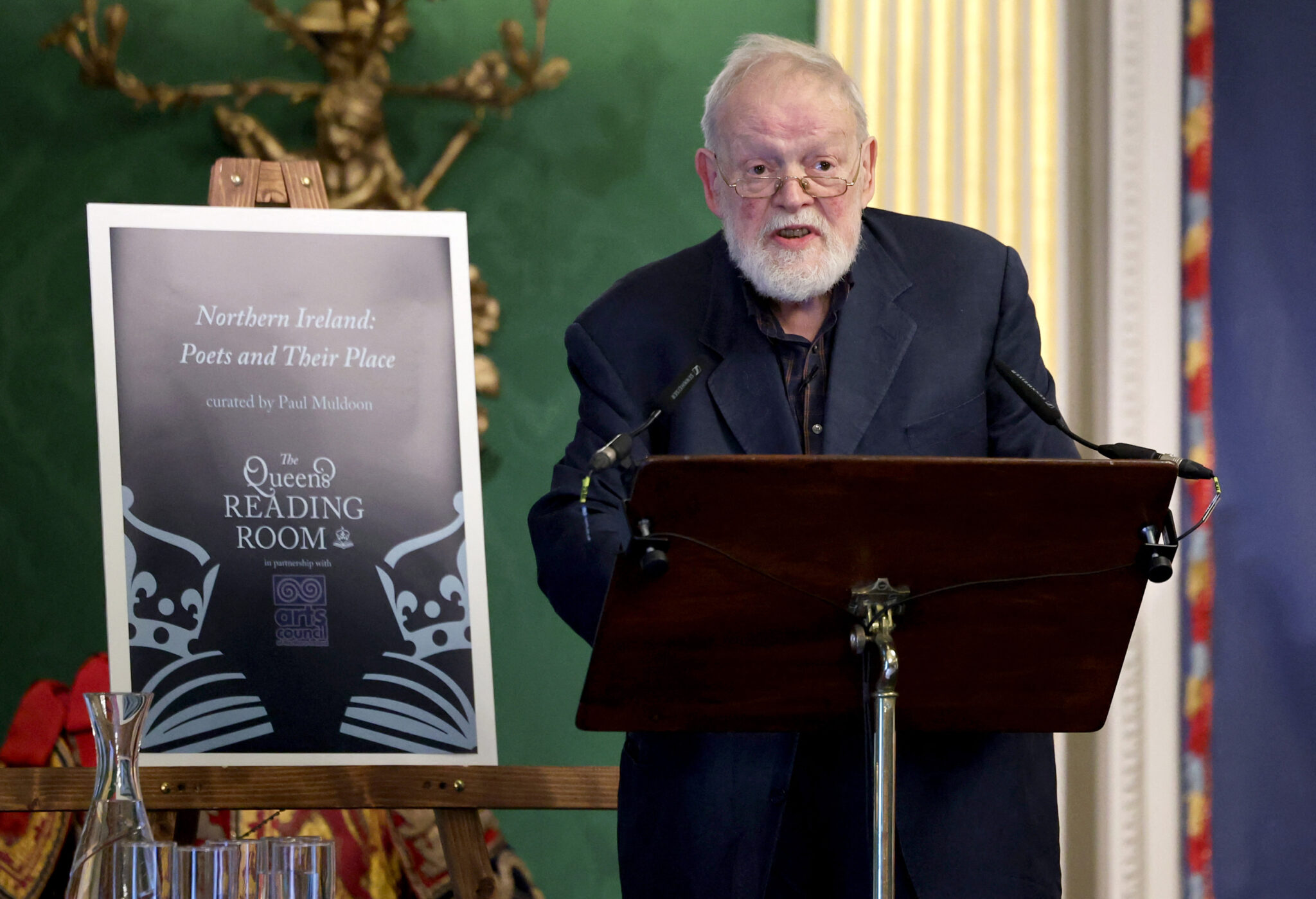In 1969, Michael Longley published his first significant collection of poems, <em>No Continuing City</em>, which featured work written during that decade. One poem was directed to Seamus Heaney. Longley and Heaney had met in Belfast, at a dinner in Philip Hobsbaum’s flat, as part of his desire to bring artists together in conversation. When Longley married Edna Broderick, a fellow poet and critic, Heaney was in attendance.
Heaney admired Longley’s work, and valued their friendship. When the Longleys quibbled with how Heaney depicted the artistic scene in Belfast in an essay, he responded with an effusively apologetic letter, postscripted: “I think until now I have enjoyed the luxuries of friendship without being aware of the full responsibilities.”
Longley forgave his friend, and in “A Personal Statement”, he chose a work specifically direted to Heaney as a way to affirm a sense of soul: “I am, in fact, / More than a bag of skin and bone. / My person is / A chamber where the elements postpone / In lively synthesis / In peace on loan.”
<em>Ash Keys: New Selected Poems</em> is a generous collection of Longley’s work, spanning decades and various collections. While a single book of poems can capture the flavour of a moment or a particular context, a selected work brings essential patterns to the surface. Perhaps because of his proximity to Heaney, or the broader tradition of Irish poetry, Longley’s religious sense has been much debated. He has largely been reticent on the subject. Born of English parents, he was raised agnostic. However, he has begun describing himself as a “sentimental disbeliever”.
“I do believe in the transcendental. I believe that poetry and art, without a transcendental element, doesn’t really exist for me,” he said in a 2016 interview. He is fascinated by the figure of Jesus: “The Sermon on the Mount, the Beatitudes, are as good a system to live by as any that I can think of, and I love them. I love them.”
Such inclinations sound more like a philosophy of religion rather than a belief. Yet Longley’s accumulated poems demonstrate sustained engagement with matters of the soul.
His poems often describe characters in an elemental state. In “The West”, the narrator “watch[es] myself, as through a sandy lens, / Materialising out of the heat-shimmers.” “Second Sight” dramatises “A lover looking for somewhere to live, / A ghost among ghosts of aunts and uncles / Who crowd around me to give directions.” In the poem’s final stanza, the bereft seeker wonders: “Where is my father’s house, where my father?” He imagines finding his grandmother, who would “see right through me and the hallway / And the miles of cloud and sky to Ireland.”
Such a sense continues in the titular poem of the book: “Ghosts of hedgers and ditchers, / The ash trees rattling keys / Above tangles of hawthorn / And bramble, alder and gorse, // Would keep me from pacing / Commonage, long perspectives / And conversations, a field / That touches the horizon.” In Longley’s work, sons are often carrying on the silent work of their fathers. That witness typically arrives as a song of lamentation.
A touching, elegiac strain marks “The White Butterfly”. In the penultimate stanza, Longley writes: “This is a dream and flowers / Are bordering the journey / And the road leads on towards / That incandescent palace / Where from one room to the next / There is no one to be seen.” His recurring imagery of rooms calls to mind a Johannine sentiment of the father preparing for the son.
Much like Heaney, who – channelling his favorite poet, WB Yeats – wrote of old age even as a young poet, Longley’s works demonstrate a memento mori. In the simultaneously jocular and thoughtful “Detour”, the narrator wants his funeral procession to include a detour “down the single street of a small market town”, where “A reverent pause to let a herd of milkers pass / Will bring me face to face with grubby parsnips, / Cauliflowers that glitter after a sunshower, / Then hay rakes, broom handles, gas cylinders.” In his playful juxtaposition of the quotidian and material with the eternal, Longley reminds readers that death is a part of life.
In that funereal sense, Longley also joins Yeats, whose Red Hanrahan character was an itinerant, ghostly poet who communed with the living. In “The Oar”, Longley writes: “I am meant to wander inland with a well-balanced oar / Until I meet people who know nothing about the sea.” In that new land, the narrator’s oar is mistaken for “a winnowing fan”. He laments being a stranger in a strange land, and “I start saying my prayers, to go on saying my prayers / Once I’m home, weary but well looked after in old age.”
The poem concludes, though, in a curious manner: “And death will come to me, a gentle sea-breeze, no more than / An exhalation, the waft from a winnowing fan or oar.” In that final line, the narrator’s identity blurs; a subtle recognition, perhaps, that our certainties will be divinely reframed – a fitting sentiment for a poet whose vision has moved in the direction of transcendence.
<em>Ash Keys: New Selected Poems by Michael Longley is published by Wake Forest University Press</em>
<strong><strong>This article appears in the October 2024 edition of the <em>Catholic Herald</em>. To subscribe to our award-winning, thought-provoking magazine and have independent, high-calibre, counter-cultural and orthodox Catholic journalism delivered to your door anywhere in the world click <a href="https://catholicherald.co.uk/subscribe/?swcfpc=1"><mark style="background-color:rgba(0, 0, 0, 0)" class="has-inline-color has-vivid-cyan-blue-color">HERE</mark></a></strong></strong>.



